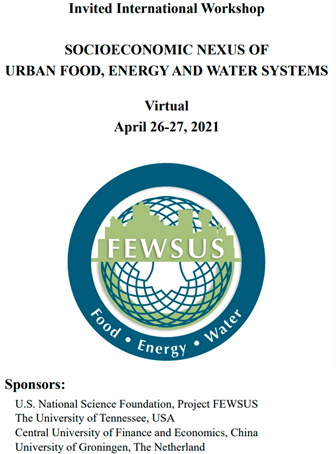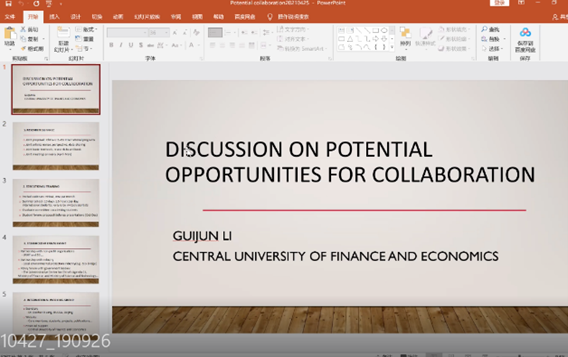From April 26-27, 2021, Professor Li Guijun, Director of Center for Global Economy and Sustainable Development(GESD)chaired the International Workshop of “SOCIOECONOMIC NEXUS OF URBAN FOOD, ENERGY AND WATER SYSTEMS” which was co-sponsored by U.S. National Science Foundation, Project FEWSUS, The University of Tennessee, USA, Central University of Finance and Economics, China and University of Groningen, The Netherland.

This meeting aims to exchange research and perspectives and establish an international working group for transdisciplinary collaborations of research and education in the area of socioeconomic impacts of FEW systems on urban sustainability. A number of professors and scholars from Central University of Finance and Economics, The University of Tennessee, University of Groningen, The Netherland USA, Chongqing University, China, World Wide Fund for Nature (WWF), Beijing Normal University, China, University of Illinois-Urbana Champaign, USA, Utah State University, USA,Guangdong University of Technology, China and international organizations made a speech and held discussions.

Increasing socioeconomic pressures, which derive from rapid growth of the urban population and overconsumption of natural resources, are threatening the security and sustainability of urban FEW systems. Research has demonstrated that the socioeconomic nexus of FEW systems is key not only to the livability and resilience of cities but also to the mitigations of FEW wastes and greenhouse gas emissions. Unfortunately, synergizing the interactions between human wellbeing and FEW consumptions in cities encounters various barriers at technological, social, policy, and economic levels. This problem is mainly caused by a lack of interdisciplinary collaborations, disengagement of stakeholders, and discoordination of policies among sectors.
On the morning of April 27, Li Guijun, the director of GESD , as the co-chair of the Workshop, delivered a keynote speech on “Potential Opportunities for International Collaboration” and he believed that a transdisciplinary discussion on the socioeconomic impacts of FEW systems on urban sustainability among researchers, stakeholders, and policymakers is important to achieve for creating stakeholder-acceptable and policy-effective opportunities that support the realization of the United Nations’ Sustainable Development Goals 11 and 12.


